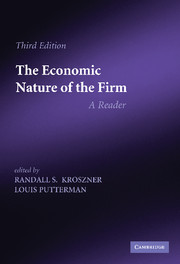Book contents
- Frontmatter
- Contents
- Editors' preface
- Reintroducing The Economic Nature of the Firm
- Part I Within and among firms: the division of labor
- Part II The scope of the firm
- Part III The employment relation, the human factor, and internal organization
- 13 Production, information costs, and economic organization
- 14 Contested exchange: new microfoundations for the political economy of capitalism
- 15 Understanding the employment relation: the analysis of idiosyncratic exchange
- 16 Multitask principal–agent analyses: incentive contracts, asset ownership, and job design
- 17 Work motivation
- 18 Worker participation
- Part IV Finance and the control of the firm
- References
- References
15 - Understanding the employment relation: the analysis of idiosyncratic exchange
Published online by Cambridge University Press: 05 June 2014
- Frontmatter
- Contents
- Editors' preface
- Reintroducing The Economic Nature of the Firm
- Part I Within and among firms: the division of labor
- Part II The scope of the firm
- Part III The employment relation, the human factor, and internal organization
- 13 Production, information costs, and economic organization
- 14 Contested exchange: new microfoundations for the political economy of capitalism
- 15 Understanding the employment relation: the analysis of idiosyncratic exchange
- 16 Multitask principal–agent analyses: incentive contracts, asset ownership, and job design
- 17 Work motivation
- 18 Worker participation
- Part IV Finance and the control of the firm
- References
- References
Summary
This paper is concerned with jobs for which nontrivial job-specific skills and task-specific knowledge evolve, in a learning by doing fashion, during the course of a worker's employment. Otherwise qualified but inexperienced workers can not be regarded as the equivalent of job incumbents under such circumstances. The underlying factors that give rise to job idiosyncrasies and the contractual properties of four alternative contracting modes for jobs of this kind are evaluated with the assistance of what we refer to as the “organizational failures framework.” Individualistic contracting modes of the contingent claims contracting, spot contracting, and authority relation types are examined. The implied demands on the rationality limits of human actors are shown to be severe and the associated costs of adapting to changing job and market circumstances are shown to be considerable for jobs of the idiosyncratic kind. Collectivizing the employment agreement alleviates these conditions in that it serves to economize on transaction costs by relieving bounds on rationality and attenuating opportunism. The upshot is that “internal labor markets,” which others have interpreted in mainly noneconomic terms, can be supplied with an efficiency rationale – additionally if not instead.
Background
Conventional treatments – indivisibilities
Indivisibilities of both physical capital and informational types are said to lead to the substitution of internal for market organization. The former involves scale economies associated with physical assets and is reasonably familiar. Larger scale units, provided they are utilized at design capacity, permit lower average costs to be realized.
- Type
- Chapter
- Information
- The Economic Nature of the FirmA Reader, pp. 212 - 231Publisher: Cambridge University PressPrint publication year: 2009



